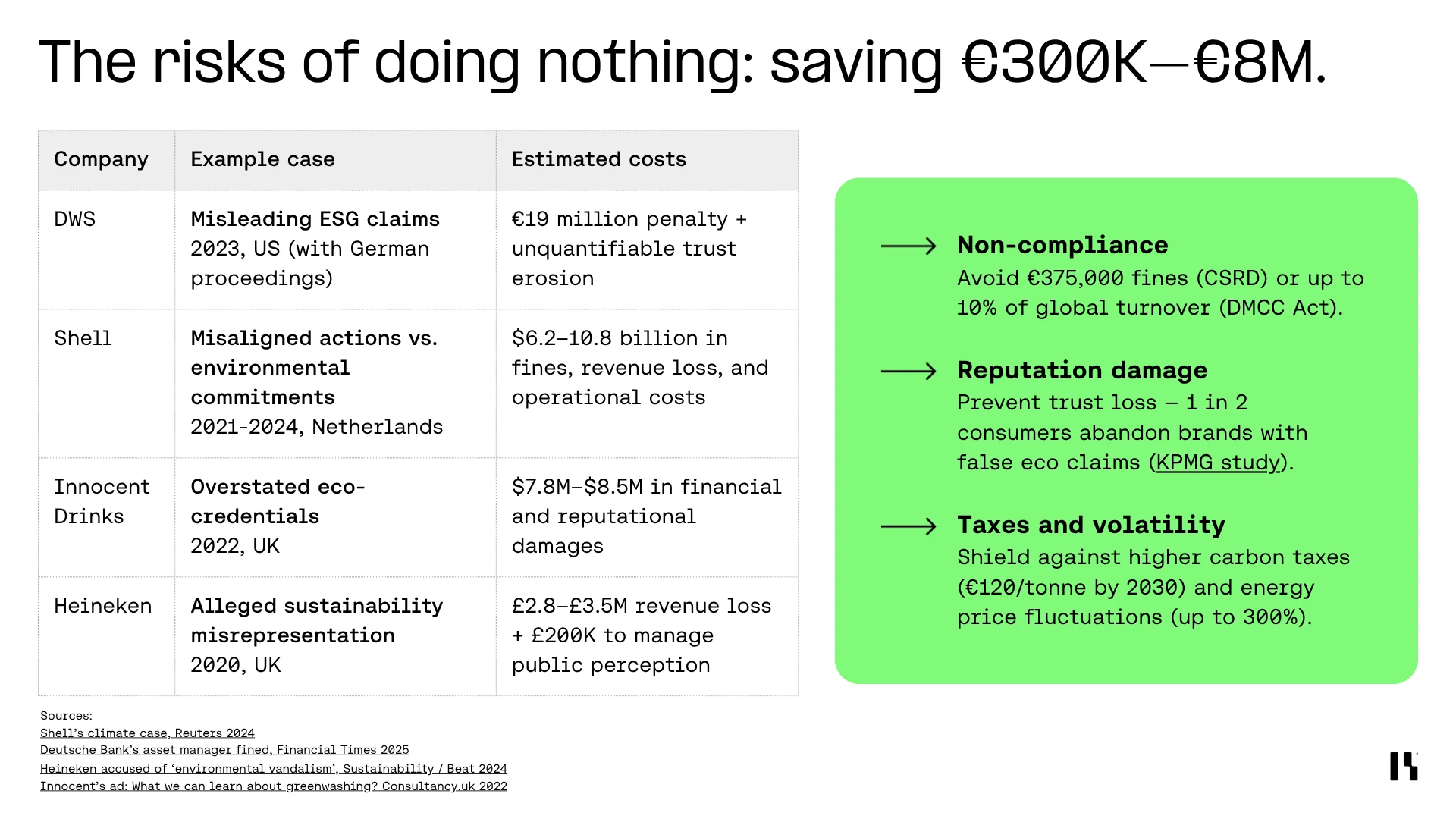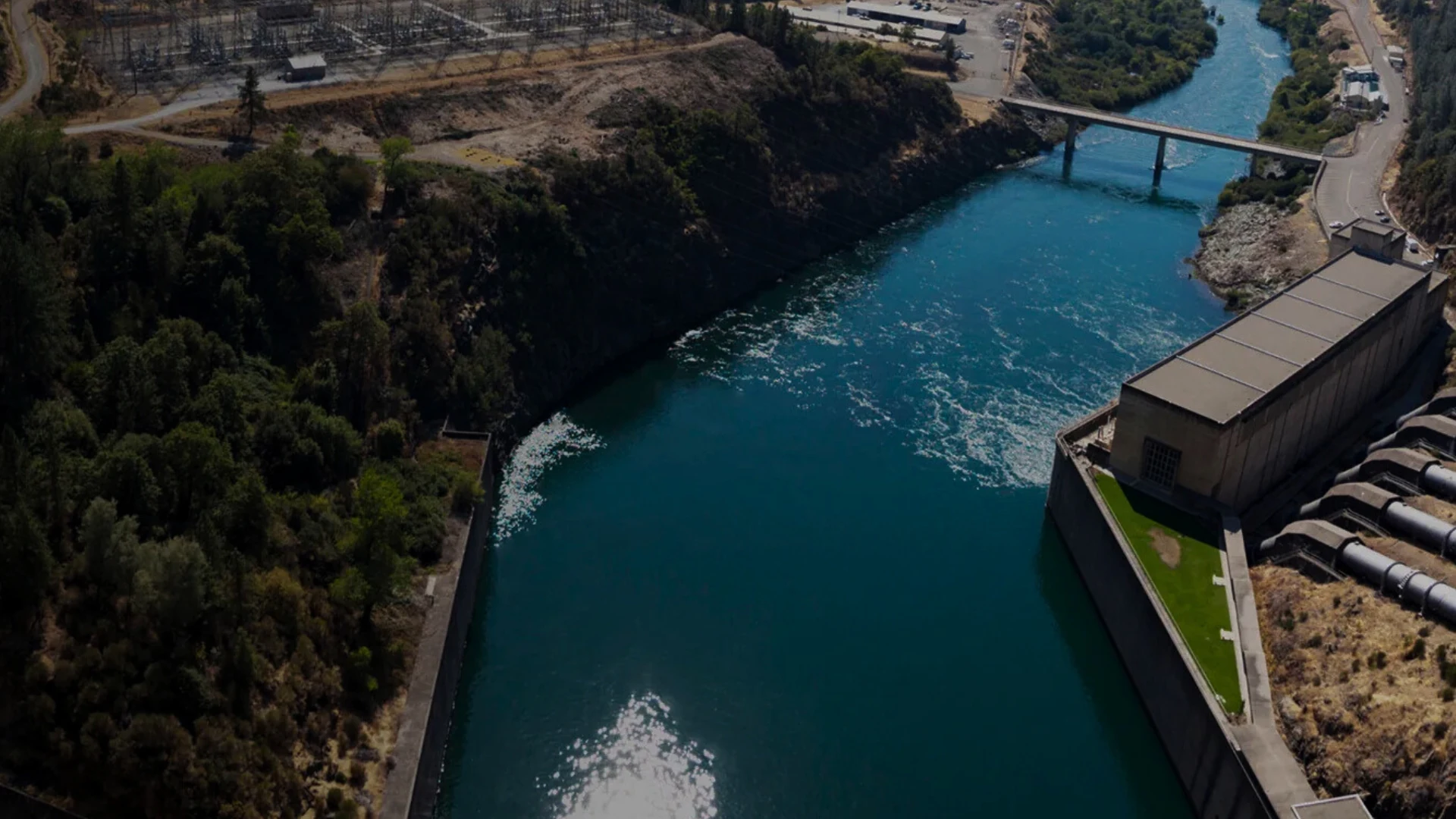For corporate energy buyers, the challenge isn’t just buying clean power — it’s knowing how to report it. With GHG Protocol updates underway, and the CSRD and Climate Group’s 24/7 CFE Coalition raising the bar, many businesses face real uncertainty about how to prepare if hourly carbon‑free energy reporting becomes mandatory.
Renewabl Track helps corporates cut through this uncertainty. By centralising data and providing real‑time CFE reporting, the platform enables companies to:
- Translate evolving regulations into actionable procurement strategies
- Track hourly CFE scores that show when and where consumption aligns with clean generation
- Replace fragmented spreadsheets with a central, verifiable system
- Gain early compliance advantages in a fast‑changing policy landscape
These renewable energy case studies demonstrate how businesses in data centres, consumer goods, and global distribution are preparing today — with transparent, scalable solutions that turn regulatory pressure into a strategic advantage.
Data centre gains emissions visibility
Client challenge
A leading European data centre operator faced a challenge common across the sector: rising electricity demand from AI and cloud computing, plus increasing scrutiny of its sustainability claims.
The operator already ran on 100% renewable energy on an annual basis, but it needed more precise, real‑time visibility. The goal was to evaluate how its electricity consumption aligned with clean energy procurement hour by hour.
Key pain points included:
- Energy costs making up ~40% of operations.
- Rapid expansion requiring more precise renewable data management across multiple sites.
- Need to track PPA performance and prove the carbon impact of existing Power Purchase Agreements.
- Pressure from evolving EU regulations, including CSRD, GHG Protocol, and Energy Efficiency Directive.
- National recognition as a leading clean energy project increased the need for transparent reporting.
Renewabl’s solution
The data centre operator adopted Renewabl Track to move from annual to hourly renewable accounting. The platform combines real-time grid data, site-level consumption, and PPA performance to measure hourly Carbon-Free Energy (CFE) scores and verified avoided emissions.
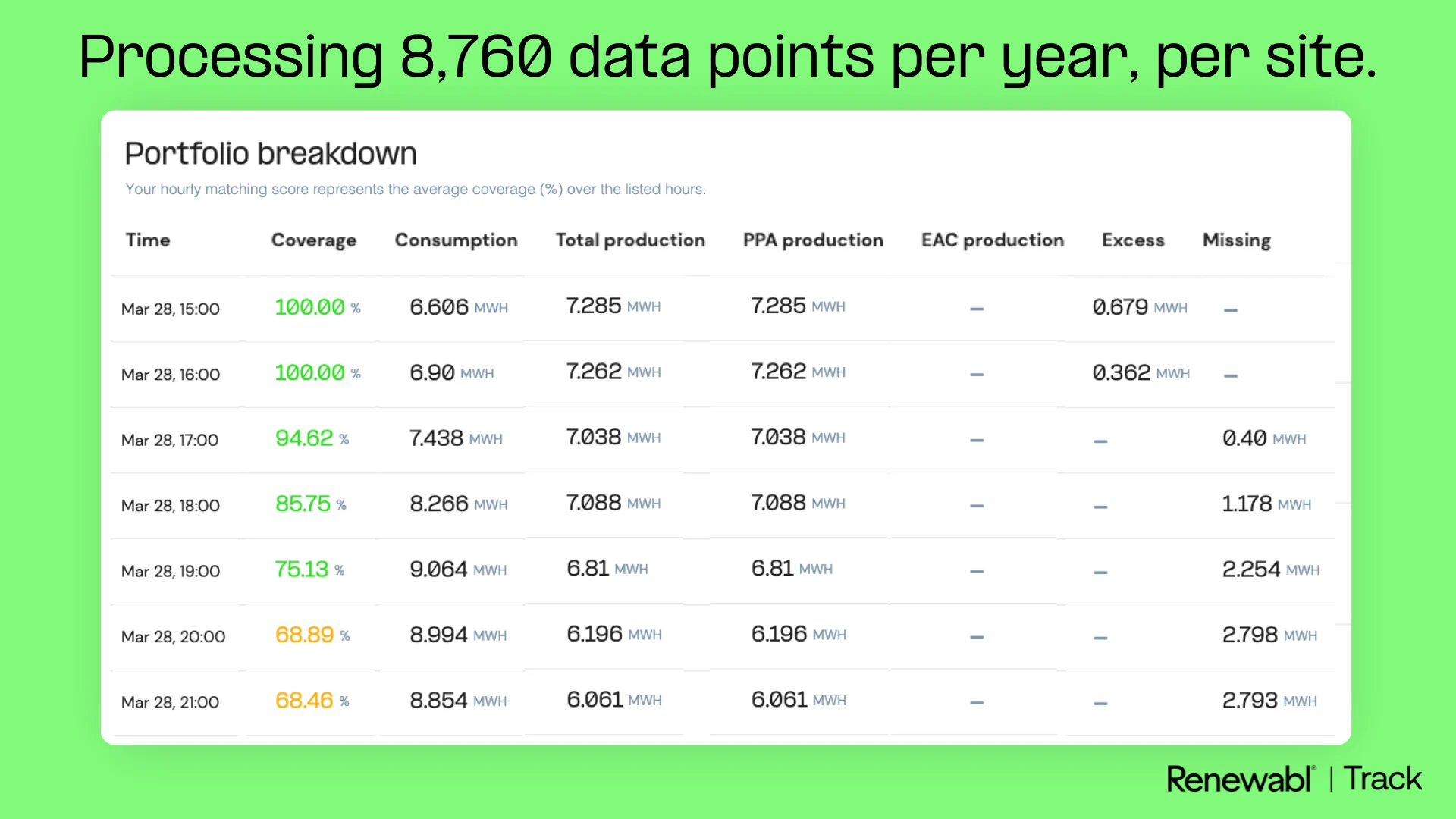
Results delivered
- Transitioned from annual renewable matching to hourly accounting across operations
- Verified real-time CO₂ reductions linked to specific PPAs
- Gained early compliance edge ahead of EU regulatory changes
- Enhanced appeal to AI and hyperscale clients demanding transparent sustainability
- Positioned for scalable renewable procurement across future sites
Value
With Renewabl, the operator now leads in clean compute transparency – closing the gap between sustainability reporting and real impact as it targets net-zero by 2030.
Consumer goods leader pilots hourly energy accounting
The challenge
A global consumer goods company launched a pilot project in Germany to prepare for upcoming Climate Group initiatives and expected GHG Protocol updates. Already achieving 100% annual renewable coverage through PPAs, GOs, and on‑site generation, the company wanted to understand its performance on an hourly and monthly basis. Challenges included:
- Annual matching in place but no clear view of hourly Carbon‑Free Energy (CFE) coverage
- Annual GOs lacked production-time data
- Uncertainty around future compliance requirements
- Need to test a scalable, tech-driven approach
Renewabl’s solution
In a pilot using Renewabl Track, the company uploaded detailed consumption data for its German site. A reconciliation feature allocated certificates by month, revealing actual CFE coverage. Renewabl then mapped hourly consumption to proxy solar and wind profiles, existing PPAs, and on-site generation.
Results delivered
- Verified monthly Carbon‑Free Energy (CFE) score across the German site
- Portfolio breakdown showing how PPAs, on‑site generation, and GOs aligned to consumption on an hourly basis
- Clarity on which instruments could count toward future hourly reporting
- Proven, scalable solution to support future regulatory compliance
Value
The pilot enabled the company to shift from annual claims to data-driven, hourly insights – setting the foundation for smarter procurement decisions and compliance-readiness as energy reporting standards evolve.
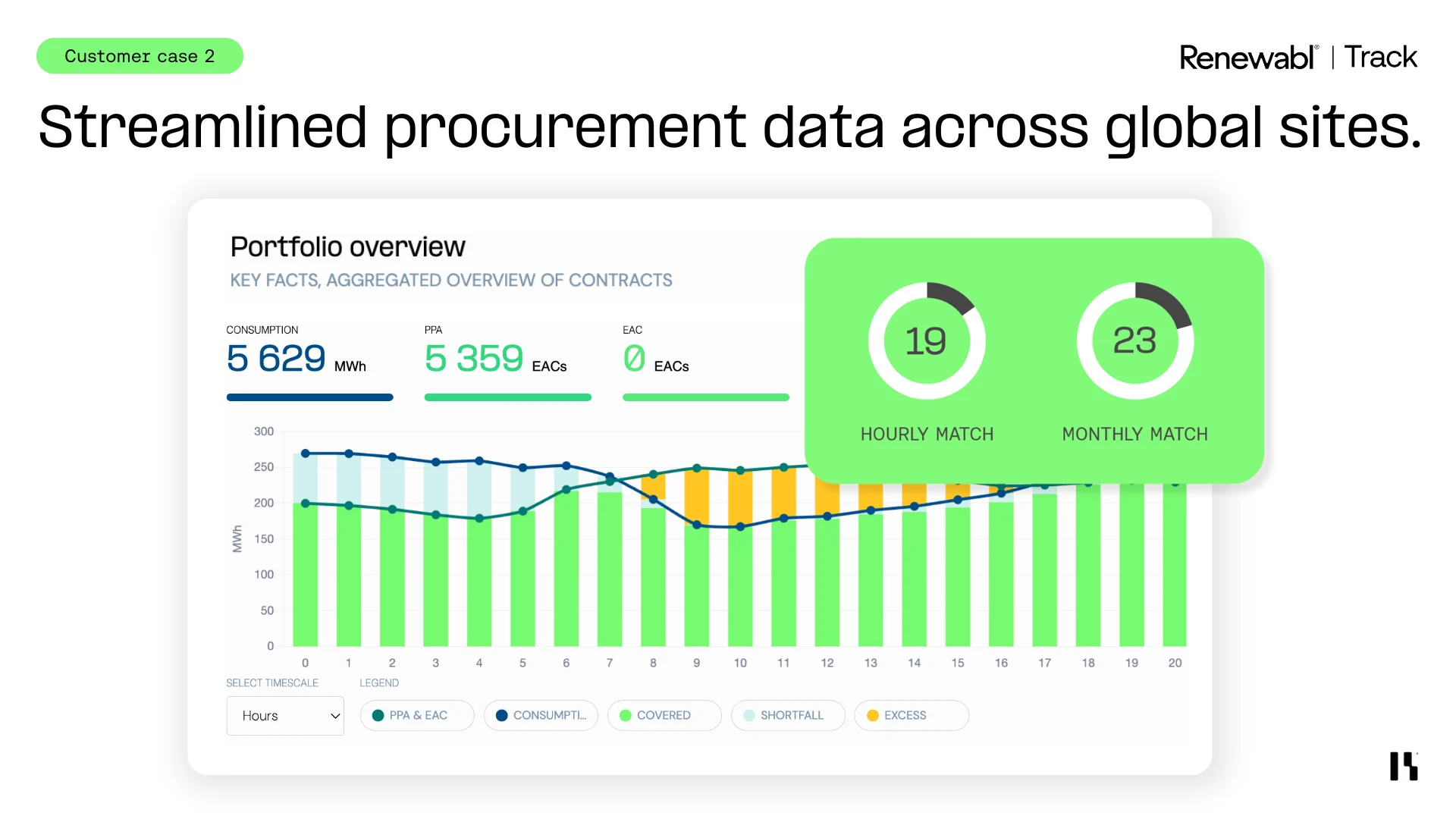
Global distributor centralises renewable contracts and consumption
Client challenge
A multinational distributor operating in five countries struggled with fragmented, manual renewable energy procurement. Until recently, each business unit handled procurement independently, with no oversight from the central team. This led to inefficiencies, inconsistent supplier pools, and a heavy reliance on spreadsheets for both consumption tracking and reporting. Key pain points included:
- Decentralised procurement across business units with no corporate oversight
- Consumption data stored in spreadsheets, prone to errors and delays
- No system for tracking contracts or aligning procurement with renewable generation
- Aspirations for quarterly matching, but no infrastructure in place
- Reporting and reconciliation required time‑consuming manual work
- Limited supplier access – especially in the U.S.
Renewabl’s solution
The company adopted Renewabl’s platform to centralise Energy Attribute Certificate (EAC) management. The first step has been onboarding all sites into the platform — over 40 to date, with more underway. Renewabl provided tailored buyer and seller guides, helping entity managers upload data and begin tracking consumption consistently. The corporate team now has a unified, real-time view of energy consumption across all regions.
Results delivered
- Centralised visibility of consumption across five countries
- Standardised data sharing and procurement workflows
- Foundation built for quarterly renewable matching
- Roadmap to compare EAC pricing by country and optimise supplier selection
- Early transparency gains not possible under previous spreadsheet-driven process
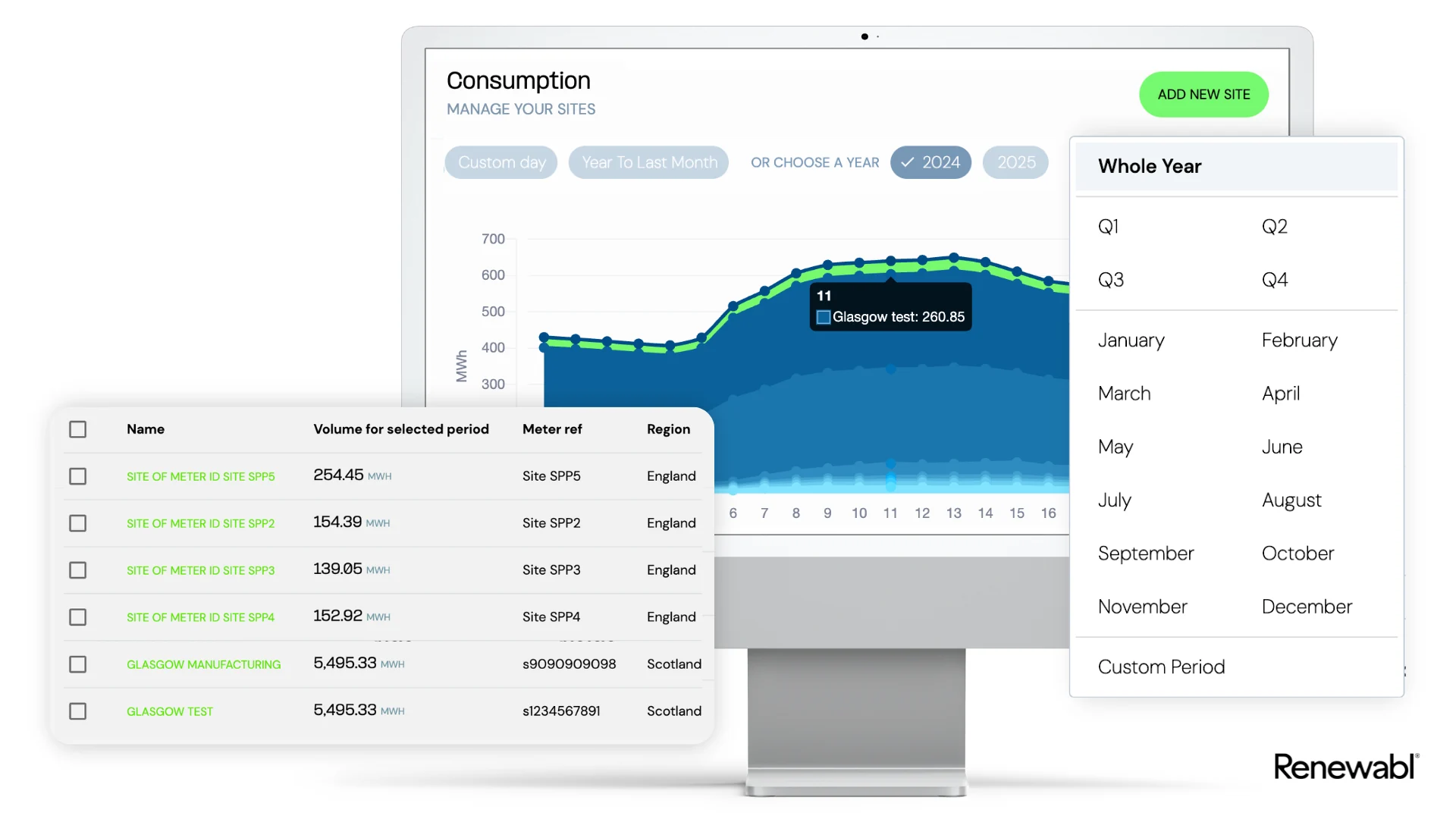
The company has already gained efficiencies and transparency that were not possible under the old decentralised, spreadsheet‑based system, and procurement through Renewabl Trade is the next step By consolidating procurement and data management, it is building the capability to optimise costs, broaden its supplier base, and credibly track progress toward its sustainability goals.
Value
With Renewabl, the company replaced a fragmented system with a scalable, digital-first approach – reducing inefficiencies and preparing for smarter, cost-effective procurement as it advances toward its sustainability goals. Next step, procurement through Renewabl Trade.
Conclusion: how renewable reporting software can help energy buyers
Corporates need more than annual renewable energy reporting – hourly accounting is becoming essential. Renewabl Track provides real‑time monitoring of carbon‑free energy procurement and emissions impact.
- Data centres use Renewabl to track hourly CFE scores and align PPAs with actual load.
- Consumer goods leaders pilot tech‑driven solutions to prepare for GHG Protocol update and Climate Group standards.
Global distributors centralise EAC management across multiple countries, replacing error prone, fragmented spreadsheets with a single transparent system.
